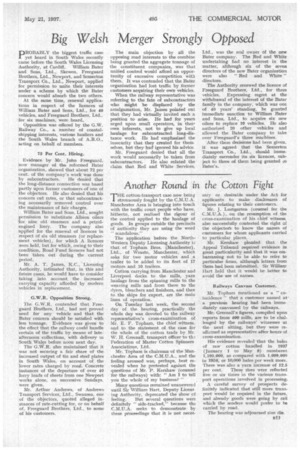Another Round in
Page 45

If you've noticed an error in this article please click here to report it so we can fix it.
the cotton Fight
THE cotton-transpOrt case now being strenuously fought by the C.M.U.A. Manchester Area is bringing into touch with the traffic court people who have, hitherto, not realized the rigour of the control applied to the haulage of goods. In groups outside the precincts of authority they are using the word " scandalous."
The application before the NorthWestern Deputy Licensing Authority is that of Topharn Bros. (Manchester), Ltd., of Weaste, Manchester, which asks for two motor vehicles and a trailer to be added to its fleet of 17 motors and 10 trailers.
Cotton carrying from Manchester and Liverpool docks to the mills, yarn haulage from the spinning mills to the weaving mills and from there to the dyers, bleachers and. finishers., and then to the ships for export, are the main lines of operation.
On Tuesday last week, the second day of the hearing, practically the whole day was devoted to the railway representative's cross-examination of Mr. E. F. Topham, the chief witness, and to the statement of the case for the whole of the cotton trade by Mr. W. H. Greenall, transport officer to ths Federation of Master Cotton Spinners Associations, Ltd.
Mr, Topham is chairman of the Manchester Area of the C.M.U.A., and the feeling aroused was, perhaps, best revealed when he protested against the questions of Mr. P. Kershaw (counsel for the railways) with: "Am I to tell you the whole of my business? "
Many questions remained unanswered until Sir William Hart, Deputy Licens ing Authority, deprecated the show of feeling. But several questions were definitely "side-tracked," because the C.H.U.A, seeks to demonstrate by these proceedings that it is not neces sary or desirable under the Act for applicants to make disclosures of figures relating to their customers.
Mr. J. Lustgarten (counsel for the C.M.U.A.),. on the resumption of the cross-examination of his chief witness, also successfully contested the right of the objectors to know the names of customers for whom applicants carried to particular places.
Mr. Kershaw pleaded that the Appeal Tribunal required evidence in great particularity and that it was embarrassing not to be able to refer to particular firms, although letters from them had been submitted.. Sir William Hart held that it would be better to avoid the use of names.
Railways Canvass Customer.
Mr. Topham mentioned as a " coincidence " that a customer named at. a previous hearing had been immediately canvassed by the railways.
Mr. Greenall's figures, compiled upon reports from 400 mills, are to be challenged by the railways' witnesses at the next sitting, but they were reaffirmed as representative after hours of cross-examination.
His evidence revealed that the bales of raw cotton handled in 1937 (January 1 to May 8)numberen I, 190,000. as compared. with 1,009,000 in 1934, or 10,000 bales perweek more. There was also a yarn increase of 12.5 per cent. These rises were reflected five or six times in the various transport operations involved in processing.
A careful survey of prospects definitely indicated that still more transport would be required in the future. and already goods were going by rail which the senders would prefer to he carried by road.
The hearing was adjourned sine die.




































































































